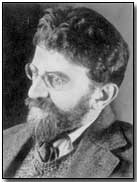Feature Articles - Munich
On The Ropes
Eisner's rule, given the anger that his actions had built up in the space of a few weeks, could never last.
Even at the time, both revolutionaries and political old hands considered his tenure a temporary one. But which way would Munich turn once Eisner lost grip? Would the radicals take control, or would the 'reasonables' take back the power they believed Eisner had stolen in the first place? If the SPD did secure a democratic mandate would they then clamp down on the extreme left as it was looking to do in Berlin and other parts of the country?
On 5 December, the SPD successfully forced Eisner to recognise the promise he had earlier made to hold elections to vote in a new Bavarian Landtag with a democratic mandate for 12 January 1919.
Eisner knew that in a conventional election campaign he would be at a disadvantage. His oratory skills, remarkable as they were, had been honed on criticising the government. Now that he was in power, he was in the unfamiliar territory of having to defend the ruling regime. The SPD, while participating in Eisner's interim government, made no bones about their opposition to him and his political allies. If they secured power Eisner's active political career would be over.
In the short term, however, there were a number of ominous developments that distracted Munich's attention away from the oncoming elections. In November a band of radical sailors arrived in the city. Although their numbers were small they were extremely vocal in their call for revolutionary socialism.
Re-invigorated by the sailor's vehement arguments, agitators decided Eisner needed to be pushed into taking Marxist measures. A leading figure from among this group was Ernst Toller, who warned that a popular vote was putting Bavaria's future in the hands of 'ignorant people'.
On 7 December a crowd of 400, including a smattering of sailors and Spartacists fronted by Erich Mühsam, broke into the offices of conservative newspapers and also Auer's offices. A number of revolutionaries grabbed the local SPD leader and, with a gun literally pointed at his head, secured his resignation as minister of the interior.
To his credit Eisner sprang into action and convinced Mühsam to call off his men. He also tore up Auer's 'resignation' letter. However, he refused to punish the offenders, lamely chastising them instead. "I know you meant well," he said, "you acted out of love for me, but it was not a good thing to do."
Treating the Spartacists and revolutionary sailors like naughty schoolchildren would have been laughable had not the danger been so great.
The far left's willingness to support Bavaria's Prime Minister was left hanging by a thread. On 11 December Munich witnessed the founding of the local Spartakusbund and its members no longer felt they owed any allegiance to Eisner. Many were even contemplating his forced removal from power.
A Marked Man
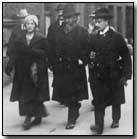 As if Eisner did not have enough on his plate there were other pressing concerns
taking their toll on his popularity. The wheels of the economy were coming
off.
As if Eisner did not have enough on his plate there were other pressing concerns
taking their toll on his popularity. The wheels of the economy were coming
off.
While Eisner was not solely to blame for this - other parts of Germany were experiencing as bad, or even worse economic difficulties - Eisner's actions compounded the view that he was somehow responsible for Bavaria's poor performance.
While the State was teetering on the edge of bankruptcy, Eisner's government was dishing out dole money to the increasing number of unemployed workers (the defence-orientated industries were laying off workers in droves) and demobilisation pay and dole money to the unemployed soldiers. When extra money was needed the government just printed some more, which led to a spiralling inflation rate.
The train system was falling apart too. One of the Allied armistice conditions was the immediate hand over of almost half of Bavaria's locomotives, which seriously damaged the already fragile supply chain. Vegetables had become one of life's most valuable commodities. Meat was unheard of, except for those willing to pay the high price on the black market.
Students were routinely gathering in Max-Joseph-Platz, in front of the winter palace and the seat of Eisner's government, and would shout "Out with the Israelite!" and "We want a Bavarian!"
Fantastic rumours began circulating about the Bavarian Prime Minister: his real name was in fact Salomon Kuchinsky and he was one of Lenin's acolytes, it was claimed. The Catholic press declared that Eisner was a threat to religion itself. The radicals in the city - both on the Right and the Left - were running out of patience.
Under Pressure
With the Armistice secured and a republic declared, the SPD and USPD 'partners' attempted to run the country and prepare for the Allies presentation of terms in 1919. The troublesome Eisner and the difficulties facing Bavaria were down on the list of their concerns.
Millions were without work as the armies of those employed to make arms and equipment were laid off. The blockade, although a little more relaxed, was still in place and still the cause of an immense logistical headache.
The SPD, trying as hard as it could to deliver the promised benefits of peace, was attacked by radicals from both the far right and left, although particularly from the latter, who were infatuated with the Bolshevik model and demanded sweeping nationalisation.
In Berlin tensions mounted with the arrival soon after the Kiel Mutiny of around 3,000 radical sailors (they named themselves the People's Naval Division) who ensconced themselves in the former Imperial Palace and Stables - the Schloss and Marstall. They immediately started to extort money out of the government for 'keeping the peace'.
Feeling threatened, the government elicited support from the High Command who had managed to maintain its cohesion despite the massed demobilisation. They agreed to back Ebert if a crisis occurred: while wary of the SPD, they knew that the alternative of USPD, or even Spartacist rule, would spell their demise.
Christmas Bonus
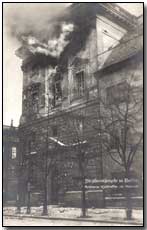 As the days passed the actions and opinions of the USPD and the Spartacists were
more and more frustrating for Ebert and his colleagues. The People's Naval
Division was also causing difficulties by asking for a 'Christmas bonus' of
80,000 marks. The government refused to pay, and, for good measure,
ordered the sailors to leave the Marstall.
As the days passed the actions and opinions of the USPD and the Spartacists were
more and more frustrating for Ebert and his colleagues. The People's Naval
Division was also causing difficulties by asking for a 'Christmas bonus' of
80,000 marks. The government refused to pay, and, for good measure,
ordered the sailors to leave the Marstall.
The sailors refused to budge and started to throw their weight around. Frustrated and fearful the SPD called in the army to break the sailors once and for all on Christmas Eve 1918.
This they came close to, but were thwarted; they agreed to a temporary truce at the moment of victory and thousands of Berliners promptly flooded into the area of operations demanding the army withdraw. The flag of truce the sailors had lifted just moments beforehand was swiftly taken back down as the army retreated in embarrassed disarray.
In protest at the use of the army the USPD withdrew from Ebert's government, while Karl Liebknecht agitated like never before. However, it was telling that Liebknecht centred all of his energies into penning editorial broadsides the Marxist paper, Rote Fahne, rather than carefully laying down a detailed revolutionary plan.
Meanwhile, Ebert acted on Groener's advice and recalled Noske from Kiel and appointed him Minister of Defence. The gruff bulky politician returned to the capital and when asked if he was up to the task of crushing the SPD's enemies, replied: "Somebody must become the bloodhound. I won't shirk from the responsibility."
Raising the stakes, Noske's opening shot was to demand the resignation of the Berlin 'Police Chief'', a USPD man called Emil Eichhorn. Knowing he had Liebknecht's backing, Eichhorn refused and when his official dismissal arrived on 4 January, Liebknecht called for an immediate strike and a series of massed rallies to come into effect on the next day - it was the beginning of Spartacist week.
On the same day, Ebert and Noske were out of Berlin reviewing a parade of the first Freikorps - a crack unit of 4,000 men who had volunteered straight from the trenches. After the battle hardened soldiers had stomped past, the two SPD men returned to a waiting automobile. Noske gave Ebert a friendly clasp on the back. "Don't worry," he said, "everything's going to turn out all right."
New Model Army
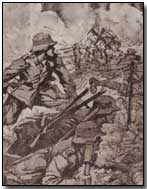 For the SPD the Freikorps appeared from out of nowhere as manna from heaven.
They knew of the force's development, but having seen the farce the army made of
attacking the Marstall they had expected the worst. The discipline and
vigour of the men even surprised Noske - and he had had a hand in their
formation.
For the SPD the Freikorps appeared from out of nowhere as manna from heaven.
They knew of the force's development, but having seen the farce the army made of
attacking the Marstall they had expected the worst. The discipline and
vigour of the men even surprised Noske - and he had had a hand in their
formation.
The seeds of the Freikorps were sown towards the end of the war. The army sensed there would be a need for a force of reliable volunteers to keep the peace in the aftermath of conflict and, of course, to dirty their hands crushing revolutionaries.
The man who proposed to set up this militia of professionals and had won the High Command's permission to do so was General Ludwig von Maercker. The Freikorps - or Free Corps - he had set up was the one Ebert and Noske reviewed on that cold January day.
A consummate army professional, Maercker recruited only the best and most loyal men - usually ex-Stormtroopers, the battle-hardened veterans who spearheaded Germany's spring and summer offensives earlier that year.
Used to working both in large formations and in small squads, the men were led by the experienced officers who addressed them in the familiar and messed with them as well. Service at the front was seen as a must have for any potential recruit.
In return, the Freikorps man received a good salary that was regularly paid (something hard to find in those times). Service in the Freikorps also counted towards his army pension.
The government was soon funding a plethora of Freikorps units that ranged in size from platoons to quasi-divisional structures. The numbers of Freikorps reserves exploded as more and more men returned from the Front. The young, who had missed the final drafts of the Kaiser's war machine, were also welcomed into this new army.
The quality, however, varied from group to group - not in terms of fighting for all were tough and hardened, but in terms of the regard for law and order.
Money aside, the chief motivational factor dictating the Freikorps and the subsequent brutality they indulged in was the hatred the men felt for those who had 'stabbed them in the back'. The Freikorps fought with the fury they had mustered at the Front - they were in no mood to offer quarter for any defeated enemy.
Nominally loyal to the SPD, in reality they had no love for the government and, in time, the far right of the Freikorps would try and wrench power from the SPD in the failed Kapp Putsch of 1920.
The Bloodhounds
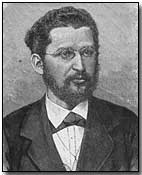 On 5 January, hundreds and thousands of Berliners gathered in the streets
waiting for Liebknecht's guidance. But instead of immediate revolutionary
action, 'Spartacus' went to officiate with the top-heavy 53-man 'Revolutionary
Committee' over a series of long-winded debates about theory and practice.
On 5 January, hundreds and thousands of Berliners gathered in the streets
waiting for Liebknecht's guidance. But instead of immediate revolutionary
action, 'Spartacus' went to officiate with the top-heavy 53-man 'Revolutionary
Committee' over a series of long-winded debates about theory and practice.
One firm decision, however, was the official foundation of the German Communist Party - the KPD.
The days of protest came to an abrupt end when on 11 January, as if from nowhere, Noske arrived in Berlin with a force of just over 4,000 Freikorps now ready for combat. More were on the way or were already in place, preparing to launch their own strikes just as soon as the order came through.
They did not have to wait long: on 13 January, Noske unleashed his bloodhounds.
The Freikorps re-took buildings occupied by revolutionaries and then closed down block after block of the city's working class districts. Spartacist resistance was crushed and its leadership dispersed. Liebknecht and Luxemburg were eventually hunted down on 15 January and brutally murdered.
The SPD, the Freikorps and the High Command knew, however, that the victory in Berlin and the destruction of Liebknecht and Luxemburg was a temporary victory. The final 'showdown' came in March after the elections to the new National assembly had been held, with the SPD securing a massive 40% of the vote (Ebert became President and Scheidemann Chancellor).
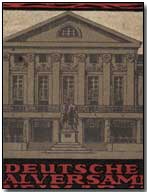 The SPD, buoyed by their
electoral mandate and in the knowledge that the power of the Freikorps was
increasingly daily, moved to destroy the People's Naval Division and the
Communist's powerbase in Berlin.
The SPD, buoyed by their
electoral mandate and in the knowledge that the power of the Freikorps was
increasingly daily, moved to destroy the People's Naval Division and the
Communist's powerbase in Berlin.
Ripping through Berlin in 4 March the Freikorps began to systematically 'liquidate' resistance. On 6 March the Communists and their Allies were pushed back to their centres of support in the working class districts. On 9 March the Communists' leadership attempted to come to terms. Noske was having none of it and the Freikorps were given a series of orders clarifying the exact nature of their task. They included the following: "Any person who bears arms against the government will be shot on the spot."
On 11 March it was the turn of the People's Naval Division to be smashed. The Marstall was quickly captured, although there was some stubborn resistance in one or two other buildings. Following a dramatic series of assaults, and an airstrike, the Naval Division was finally broken and destroyed.
On 13 March operations were declared finished as the last Communist strongholds fell. The fury unleashed by Noske's hurricane had caused an estimated 10,000 casualties. The toll on the Freikorps was minimal.
The drama of Berlin and the blood spilt there had distracted the government's attention, as had other uprisings in major industrial cities. There was also Versailles and the Allied demands to worry about. The price Germany would have to pay was still to be decided, and it was clear that whatever terms the 'Big Three' of Wilson, Lloyd George and Clemenceau came up with, they would be harsh. In the scheme of things, Munich and its eccentric ruler were low on the list of priorities.
Next - Back To Bavaria
"Suicide Ditch" was a term used by British soldiers to refer to the front-line trench.
- Did you know?

